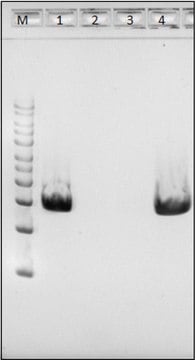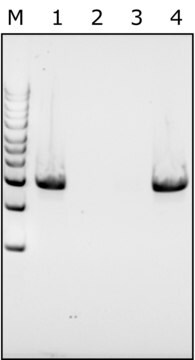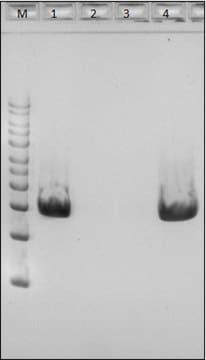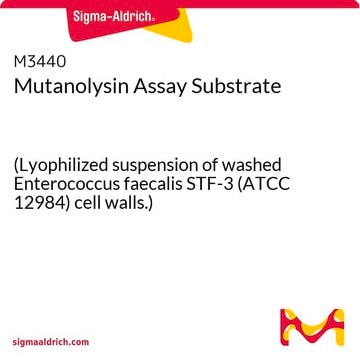MAC4L
MetaPolyzyme
lyophilized powder
Synonym(e):
Multilytic Enzyme Mix
Anmeldenzur Ansicht organisationsspezifischer und vertraglich vereinbarter Preise
Alle Fotos(2)
About This Item
UNSPSC-Code:
12352204
NACRES:
NA.54
Empfohlene Produkte
Form
lyophilized powder
Qualitätsniveau
Methode(n)
DNA extraction: suitable
Eignung
suitable for microbiology
Anwendung(en)
microbiology
Versandbedingung
wet ice
Lagertemp.
−20°C
Allgemeine Beschreibung
Metagenomics analysis looks at all DNA that has been isolated directly from given single samples (e.g. environmental samples, biological organisms). Metagenomics allows for the investigation of microbes that exist in any environment (including extreme environments), and which have been historically difficult to isolate, culture, and study. Metagenomics has revealed the existence of novel microbial species. Applications of metagenomic studies include public health data analysis, discovery of novel proteins, enzymes and natural products, environmental studies, and agricultural investigations.
Anwendung
MetaPolyzyme is a mixture of 6 enzymes that is intended for isolation of total DNA for metagenomics studies. Adapted from an initial formulation devised by S. Tighe,2 MetaPolyzyme was evaluated and developed in consultation and collaboration with the Association of Biomolecular Resource Facilities (ABRF) Metagenomics and Microbiome Research Group (MMRG). Test data on the use of MetaPolyzyme is accessible at the 2017 ABRF MGRG Poster.
Biochem./physiol. Wirkung
Microbes can be difficult to disrupt because the cell walls may form capsules or resistant spores. DNA can be extracted by using lysing enzymes (such as lyticase or chitinase) to induce partial spheroplast formation. Spheroplasts are subsequently lysed to release DNA. MetaPolyzyme is intended for use in metagenomic studies, such as study of microbes and microbiomes of extreme and unique environments. MetaPolyzyme is intended for digestion of microbes for evaluation by whole genome shotgun sequencing for metagenomics and metatranscriptomic approaches.
Komponenten
The enzymes in MetaPolyzme are:
- Achromopeptidase
- Chitinase
- Lyticase
- Lysostaphin
- Lysozyme
- Mutanolysin
Einheitendefinition
One unit will lyse 0.4 μg of Micrococcus lysodeikticus per minute by turbidimetric detection at 600 nm when suspended in buffer at pH 8.0 at 37 °C.
Signalwort
Danger
H-Sätze
P-Sätze
Gefahreneinstufungen
Resp. Sens. 1
Lagerklassenschlüssel
11 - Combustible Solids
WGK
WGK 3
Flammpunkt (°F)
Not applicable
Flammpunkt (°C)
Not applicable
Analysenzertifikate (COA)
Suchen Sie nach Analysenzertifikate (COA), indem Sie die Lot-/Chargennummer des Produkts eingeben. Lot- und Chargennummern sind auf dem Produktetikett hinter den Wörtern ‘Lot’ oder ‘Batch’ (Lot oder Charge) zu finden.
Besitzen Sie dieses Produkt bereits?
In der Dokumentenbibliothek finden Sie die Dokumentation zu den Produkten, die Sie kürzlich erworben haben.
Kunden haben sich ebenfalls angesehen
Improved high-molecular-weight DNA extraction, nanopore sequencing and metagenomic assembly from the human gut microbiome.
Maghini DG et al.
Nature Protocols, 16, 458-471 (2021)
Scott Tighe et al.
Journal of biomolecular techniques : JBT, 28(1), 31-39 (2017-03-25)
The Extreme Microbiome Project (XMP) is a project launched by the Association of Biomolecular Resource Facilities Metagenomics Research Group (ABRF MGRG) that focuses on whole genome shotgun sequencing of extreme and unique environments using a wide variety of biomolecular techniques.
Nezar Noor Al-Hebshi et al.
Journal of oral microbiology, 11(1), 1557986-1557986 (2019-01-24)
Studies of the microbiome associated with dental caries have largely relied on 16S rRNA sequence analysis, which is associated with PCR biases, low taxonomic resolution, and inability to accurately study functions. Here, we employed whole metagenome shotgun sequencing, coupled with
Cartography of Opportunistic Pathogens and Antibiotic Resistance Genes in a Tertiary Hospital Environment.
Chng KR et al.
Nature Medicine, 26(6), 941-951 (2020)
Maria A Sierra et al.
Environmental microbiome, 17(1), 60-60 (2022-12-22)
Lake Hillier is a hypersaline lake known for its distinctive bright pink color. The cause of this phenomenon in other hypersaline sites has been attributed to halophiles, Dunaliella, and Salinibacter, however, a systematic analysis of the microbial communities, their functional
Unser Team von Wissenschaftlern verfügt über Erfahrung in allen Forschungsbereichen einschließlich Life Science, Materialwissenschaften, chemischer Synthese, Chromatographie, Analytik und vielen mehr..
Setzen Sie sich mit dem technischen Dienst in Verbindung.











